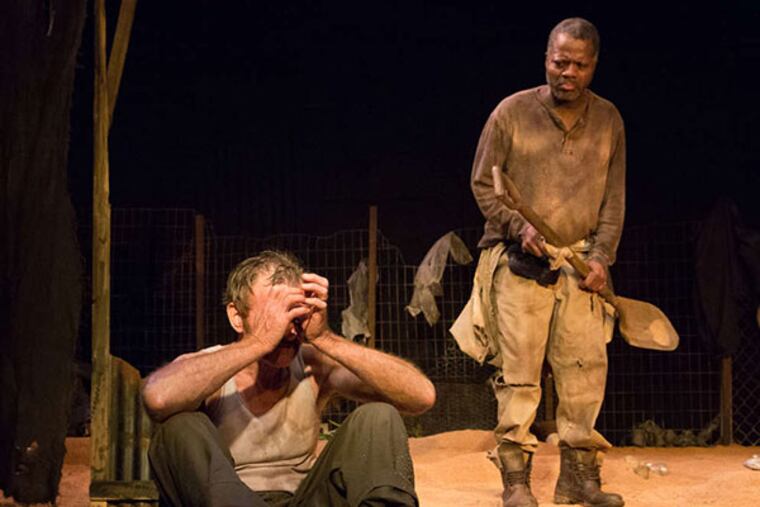Fugard vents scattershot rage in 'The Train Driver'
For more than 50 years, South African playwright Athol Fugard used his writing to fight apartheid in his native land. Apartheid ended in 1994; the Lantern Theater's stirring, if exhausting, production of Fugard's 2010 The Train Driver shows the playwright still needs something to fight against.

For more than 50 years, South African playwright Athol Fugard used his writing to fight apartheid in his native land. Apartheid ended in 1994; the Lantern Theater's stirring, if exhausting, production of Fugard's 2010 The Train Driver shows the playwright still needs something to fight against.
The Train Driver opens on Simon (Kirk Wendell Brown), a black gravedigger whose daily life is interrupted by Roelf (Peter DeLaurier), a white train driver traumatized when his locomotive killed a young black woman who walked onto the tracks with her baby.
Roelf expresses guilt, and torment, and more guilt. He spends several nights in Simon's shack, lulling Simon to sleep with trite 20-minute monologues about his desire to move past the accident and get back to his comfortable life and family. The plot possesses all the drama of a therapy session (and some very gripping plays center on therapy sessions, such as Equus, or The Talking Cure).
But here, Fugard uses Roelf as a proxy of agonized guilt (something DeLaurier fully conveys) over the injustices that persist. Simon lives in a tin-roofed shack. He buries the nameless dead in a segregated cemetery in a region plagued by gangs of knife-wielding boys, a place whose inhabitants live without running water, toilets, or hope.
Lance Kniskern's sand-covered set litters its graves with hubcaps, car mufflers, and debris in stark contrast to the well-manicured lawns of the more privileged dead. Christopher Colucci's tormenting sound design fills the night air with the howls of wild dogs.
Despite his few lines and his character's vastly different background, Brown convinces that he cares about Roelf's quest and that empathy can grow across vast divides. DeLaurier, who arrives in khakis and a polo jacket, devolves to a shirtless, shoeless Lear in a graveyard. Director Matt Pfeiffer searches for the human element in this story, and with these two actors, he finds it.
But in a speeding locomotive, Fugard has chosen the wrong metaphor, one that blurs the categories of guilt, blame, restitution, sanction, and punishment.
In apartheid, he had a monolithic, clearly unjust external enemy to contest, and whose injustices he helped bring to international awareness. In The Train Driver, there's no such foe, and thus it's all about him, his own torment, and the indulgence it took to write a play (and present it, at his self-named theater in Cape Town, no less).
I hope that resolved the issue for him enough not to write another 90-minute work about it.
The Train Driver
Presented by Lantern Theater at St. Stephen's Theater, 10th and Ludlow Streets, through May 4.
Tickets: $10-$38 215-829-0395 or lanterntheater.org
EndText